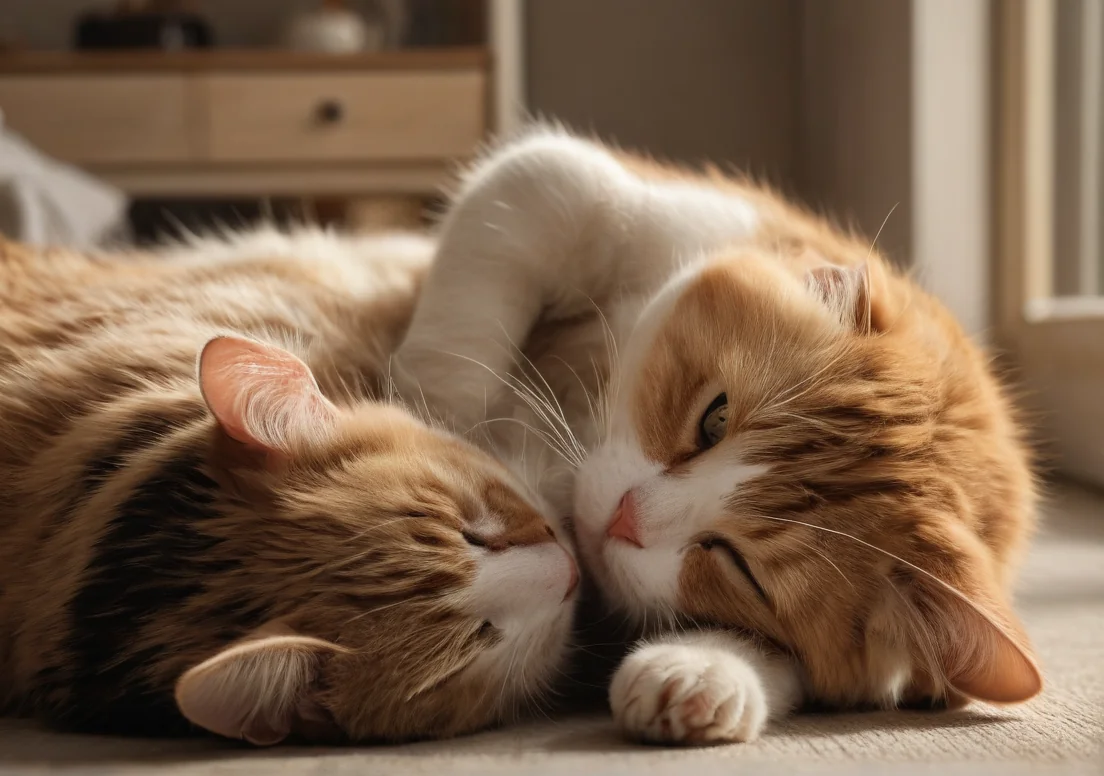Why does your cat insist on crawling on you while you sleep? For many cat owners, it’s a nightly ritual that can range from adorable to slightly annoying. But understanding this behavior can deepen your bond with your feline friend.
Cats often crawl on you at night for comfort and affection, seeking warmth, security, and a close connection with their human. There’s something particularly intriguing about this behavior, one that goes beyond just a simple snuggle. Read on to uncover the layers behind this night-time phenomenon that could surprise you!

What drives your cat to seek closeness at night
Cats are creatures of comfort, and nighttime is when many of their instincts kick in. As natural crepuscular animals, they’re most active during dawn and dusk, which means they often feel a deep-rooted urge to snuggle as night settles in. Your cat may seek your warm presence as a way to satisfy their need for companionship and security.
The bond between you and your pet plays a significant role in this behavior. When they crawl on you at night, it’s much more than a mere physical act; they’re looking for connection and reassurance. The warmth and rhythmic sound of your heartbeat can provide a sense of calm, especially in the dark, which can seem vast and intimidating to a small creature like a cat.
Additionally, your cat may see you as their safe haven. The home environment, and particularly the place where you rest, signifies a territory that’s familiar and safe. When they curl up next to or on you, it might be their way of saying they trust you and feel secure in your presence. This nightly ritual can also be rooted in their wild ancestry, where seeking closeness meant safety from predators.
Is it a sign of affection or dependency
Curious if your cat’s nighttime crawling is a loving gesture or a neediness issue? It often depends on the context of your relationship with them. If your cat seeks you out regularly while you sleep, it’s likely a mix of both. Here’s a quick rundown:
Affection : Cats express love in unique ways. When they crawl on you, they may be marking you with their scent, which is a sign of affection and ownership. This behavior is often paired with purring or kneading, both strong indicators of contentment.
Dependency : If your cat exhibits anxious behavior when left alone or during the day, this could hint at attachment issues. Their nighttime cuddles may indicate a reliance on you for comfort, especially if they struggle to settle down without your presence.
Routine : Cats thrive on routine. If crawling on you has become part of their nighttime ritual, it reinforces familiarity and comfort, showcasing both love and possible reliance.
To determine the balance between affection and dependency, observe their behavior throughout the day. If they engage in play and seem confident alone, it’s probably safe to say those nighttime cuddles are rooted in love, but if they consistently look for you or show signs of distress, it may signal a deeper need for comfort.
For more insight into understanding cat behavior, check out the detailed Cat Behavior Association resource.
Pro tip : If you’re concerned about dependency, try providing a cozy blanket or bed near yours. This way, your cat can feel close without needing to be directly on top of you, helping to promote their independence while still offering comfort.
How does your cat’s breed influence this behavior
Certain cat breeds have distinct tendencies that contribute to why they love to crawl on you at night. For instance, Siamese and Ragdolls are notorious for being especially social, craving attention and physical closeness. They tend to seek out their humans, particularly at night when you’re quiet and calm.
Maine Coons , on the other hand, are known for their affectionate yet independent nature, often showing more subtle signs of affection, but they’ll still find their way to curl up next to you when it’s time to wind down. Then you have Bengals, who are highly active and curious. While they might not be as cuddly at night, they might still crawl over you if they seek comfort or want to share their energy.
Mixed-breed cats can exhibit an array of behaviors, often depending on their upbringing and environment. Cats that are raised with ample human interaction are more likely to exhibit this crawling behavior at night, regardless of breed. Understanding your cat’s breed-specific traits can explain a lot about their nighttime behavior.
For a deeper dive into cat breeds and personality, check out the Cat Fanciers’ Association’s Breed Information.
What do kittens teach us about this habit
Kittens are the primary architects of their nighttime habits, and watching them grow gives you insight into what to expect later on. Those early weeks are filled with learning, and it’s during this time that they pick up attachment behaviors.
When they snuggle up to their mother or littermates at night, it fosters a sense of safety and warmth. As they mature, these behaviors often evolve into a need to seek out that comfort from their human companions. This tendency to crawl onto you might stem from the security they’ve felt as tiny kittens.
This instinct can particularly linger if you’ve adopted a kitten and spent quality time with them during their formative months. The more affection and physical contact they received from you, the more likely they’ll carry that over into adult life. So, it’s not just about nighttime warmth; it’s a deep-seated emotional bond.
Observing your kitten’s behavior can give you insight into how strong that bond will be as they grow. Pay attention to their social interactions and comfort levels—they’re laying the groundwork for those cozy, crawly nights ahead.
How does your cat’s personality affect its behavior
Each cat comes with its own unique set of quirks, and personality plays a significant role in why your feline friend might decide to crawl on you at night. Some cats are naturally more affectionate, while others are a bit more independent.
If your cat is a social butterfly, it likely craves closeness, especially during the night when it might feel a little vulnerable. These cats often seek out their humans for comfort and warmth, reflecting their need for connection. On the other hand, if your cat is more of a loner, that nighttime snuggle session might be a rare treat, indicating a deeper bond forming.
Age can also influence these behaviors. Kittens, for example, may snuggle more as they seek safety and reassurance, while older cats may request a warm spot on your lap as a signal of affection or to find solace as they deal with age-related issues. Pay attention to your cat’s mood and preferences; it might surprise you how much their cuddling habits reveal about their feelings.
Could your cat be feeling cold at night
Cats often prefer cozy spots, especially when temperatures dip. If the nights are chilly, there’s a good chance your cat is merely trying to find a warm place to settle down.
Cats don’t just want comfort; they also naturally gravitate towards your body heat. When your temperature drops, your cat may search for your warmth. This instinctual behavior can be heightened in colder months, making your lap an inviting snuggle zone.
Keep in mind a few things to ensure your furry buddy stays cozy:
- Provide blankets: Having a warm blanket nearby can give your cat a comfortable option if they don’t want to crowd you.
- Watch the thermostat: If your house gets overly chilly at night, consider raising the temperature slightly to keep everyone comfortable.
- Create cozy spaces: Setting up warm cat beds or heated pads in your home can draw your cat away from monopolizing your personal space at night.
And don’t forget—upgrading to a scratching post with a cozy cave can give your cat options and might even channel their nighttime energy into play instead of cuddling! If you want to explore more about your cat’s behavior and body temperature, check out the ASPCA.
Keep the warmth accessible and observe your cat’s shifting preferences—after all, a happy cat leads to a peaceful night!
What health issues might lead to increased nighttime affection
Changes in your cat’s behavior, especially if they’re seeking more affection at night, can sometimes signal underlying health concerns. A few specific health issues to keep an eye on include:
Arthritis : Cats can develop joint pain just like humans. This might cause them to seek warmth and comfort, which you provide. Look for signs like limping or difficulty jumping.
Hyperthyroidism : This is common in older cats and can lead to increased anxiety or restlessness, causing them to seek your presence more as they try to calm down.
Anxiety or Stress : Environmental changes, such as moving to a new home or new pets, can lead to heightened stress levels. Your cat might crawl on you to gain reassurance.
Illness or Pain : If your cat is feeling unwell, they might cling to you for comfort. Look for other signs like changes in appetite or lethargy.
It’s a good idea to consult your vet if you’re noticing significant changes in your cat’s behavior. Regular check-ups can help spot potential health issues early on.
How can you adjust your sleep environment for both you and your cat
Creating a comfortable sleep space for both you and your cat can go a long way in ensuring a peaceful night. Here are some easy adjustments you can make:
Dedicated Cat Bed : Invest in a comfy bed for your cat near your bedroom. This option gives them a cozy place to retreat when they need space but still feel close to you.
Nightlight : Cats often feel more secure in dim lighting. A soft nightlight can help them navigate without feeling anxious.
Temperature Control : Cats love warmth. Ensure your cat has access to a warm spot without overheating you. Whether it’s an extra blanket for them or a cozy heating pad, keep it balanced.
Barrier Options : If your cat insists on crawling over you and disrupting your sleep, consider a barrier like a baby gate if they’re prone to wandering. This allows them freedom without compromising your sleep.
Calming Sprays : Use feline pheromones or calming sprays around the sleeping area. These can help reduce anxiety and promote a more restful night for both of you.
Finally, having a consistent bedtime routine that involves playful activities before sleeping can help your cat wind down, making them less likely to pester you at night.
For further insights into creating a tranquil home for you and your pet, check out the resources at the American Humane Society: American Humane.
Can this behavior change with age
Cats have dynamic personalities that can shift as they grow older. When they’re kittens, they often exhibit heightened curiosity and playfulness, which might manifest as crawling on their humans during the night. This is usually driven by their instinctual need for comfort and security.
As cats transition into adulthood and seniority, their nighttime behavior can change considerably. Older cats may become less active or playful and might seek snuggles and closeness for comfort. For some cats, this crawling may evolve into more passive behavior, like sitting close by instead of actively crawling over you.
Additionally, age can bring changes in health and comfort—cats might crawl on you more if they’re feeling anxious or if health issues make them crave warmth and companionship. Keep an eye on these shifts; it’s part of understanding your feline friend better as they age.
What unique quirks do cats have that explain their nighttime antics
Cats are quirky creatures, and their nighttime crawling could stem from a mix of instinct and personality. Here are some fun behaviors that help explain this common nighttime ritual:
Territorial Instincts : Cats are natural hunters and may feel the need to mark their territory, even if that territory is your bed.
Warmth Seekers : Cats are drawn to warm places. Your body heat offers them a cozy refuge during night hours.
Attention Hounds : Sometimes, they’re just after some love—cats can be incredibly social and might crawl onto you for those late-night pets.
Natural Predators : Cats are crepuscular, meaning they’re most active during dawn and dusk. Crawling on you at night might simply be part of their natural rhythm, looking for activity during what they consider prime time.
Comfort and Security : Especially if you’ve recently moved or made changes in the home, your cat might crawl onto you for reassurance.
Reflecting on these behaviors can help normalize your cat’s antics and give you insight into their vivid, instinct-driven world.
For more in-depth insights on feline behavior, check out The Cat Behavior Clinic.
Alex, a passionate animal lover, has experience in training and understanding animal behavior. As a proud pet parent to two dogs and three cats, he founded AnimalReport.net to share insights from animal experts and expand his knowledge of the animal kingdom.




